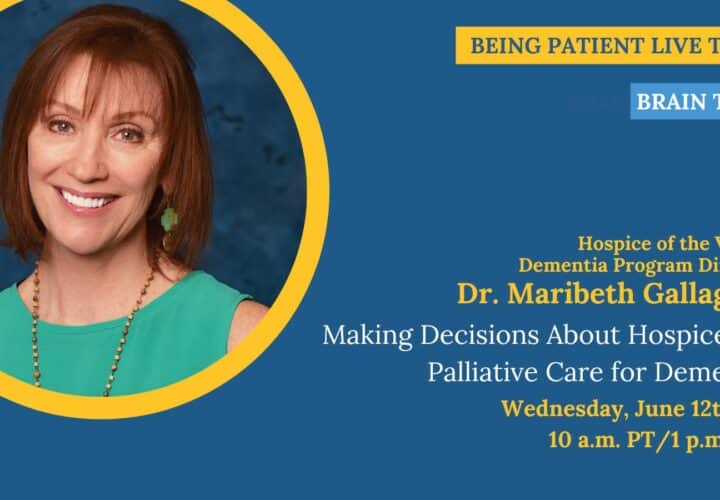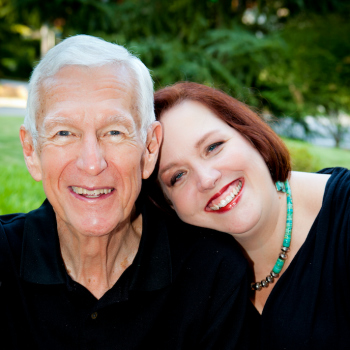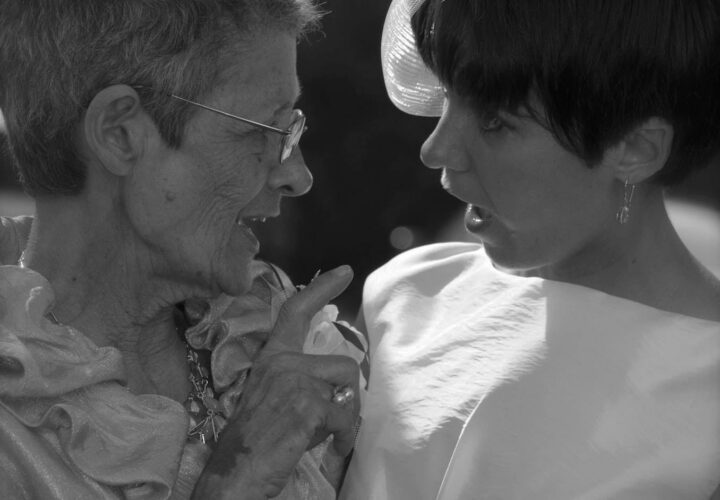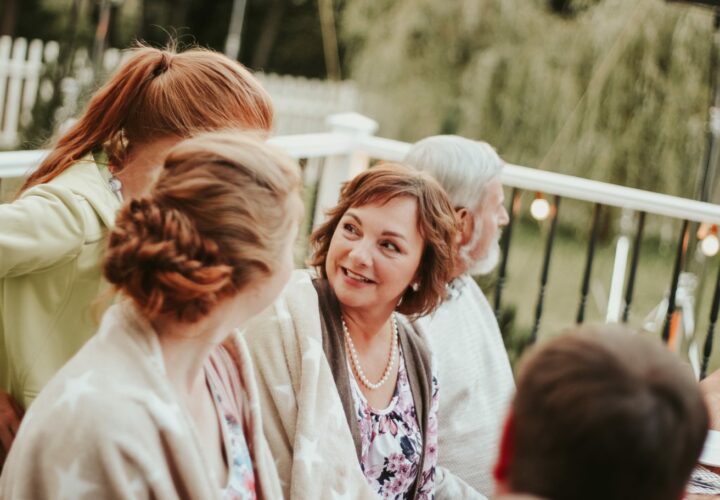In the later stages of Alzheimer’s, palliative and hospice care can be necessary. But how do you find a facility designed for dementia patients? Hospice of the Valley’s Dr. Maribeth Gallagher explains what caregivers need to know about these types of care.
As people living with dementia need more support or approach the end of life, palliative or hospice care may be needed. But making the decision to choose this kind of care can be a difficult one and some programs may not be equipped for dementia patients. So, how do you make the right call for your loved one?
Dr. Maribeth Gallagher, director of Arizona’s Hospice of the Valley dementia program, joins Being Patient video reporter Mark Niu to discuss how to make these difficult decisions and what makes a palliative or hospice care program “dementia-capable.”
Gallagher’s work directing the Hospice of the Valley’s dementia program has received national and international awards for its innovative approaches. Her focus on dementia care was initially inspired by her personal experiences as a family caregiver, sharing the journey with her loved one from diagnosis to death.
Read or watch the full conversation below.
Being Patient: Tell us about your background. I hear a very important part of it has much to do with your voice.
Maribeth Gallagher: For 30 years, I made my living as a singer, but then I had a loved one who had dementia. The journey … from pre-diagnosis all the way to death was, at times, very bumpy. It was, to say the least, a transformative experience, [and] by the end of it, I realized I wanted to go back to school and earn degrees so that perhaps, in some small way, I may be able to contribute to people living with dementia and their care partners. As Dr. Maya Angelou would say, “When we know better, we do better.”
Being Patient: How did you start working with Hospice of the Valley?
Gallagher: Over 20 years ago, Hospice of the Valley had the insight to recognize that there was going to be an increasing number of people who were dying from Alzheimer’s disease or some other form of dementia. Hospice, if you know anything about it, was originally created on a cancer model … meaning that people, until they died, were cognitively intact [and] could report their own symptoms.
The families could have interactions and get their directions from [their loved ones,] but we know with dementia that’s quite different. Hospice of the Valley decided to create a dementia program in hopes that we could explore and innovate so that we could help hospices become more “dementia-capable,” as we say, so that truly we not only help you die peacefully, but as Cicely Saunders [the British nurse known for her role in the birth of the hospice movement] would say, “We help you live well until you die.”
Being Patient: What’s the difference between hospice and palliative care for dementia?
Gallagher: First of all, people tend to think that palliative care is hospice care, and that’s a myth. Palliative care is specialty care that focuses on symptom management and comfort in its many forms: body, mind, and spirit. [It’s] also helping people who have stress.
This palliative care is for people with serious illnesses; we not only care for the person with the condition, but also their care partners, their families, and friends, to help everybody be their best. Palliative care is for any stage.
As it pertains to dementia, your needs up front when you get diagnosed are different, perhaps, from when [you are] in the moderate stage and the advanced stage. Palliative care, most simplistically, would be referred to as comfort care and support. Who doesn’t want comfort and support, right? Then, when we get all the way to the last approximately six months of life, that’s when hospice care is provided. Hospice is just an even more specialized type of palliative care.
“Palliative care, most simplistically,
would be referred to as comfort care and
support. Who doesn’t want
comfort and support, right?”
Being Patient: When people are looking for palliative care, what should they look for in [a] facility?
Gallagher: I think the first thing I would do is I would go to my provider. Whoever you’ve established a relationship with, you trust — ask the providers because they’re probably in the know. You’re not the only client that’s facing these challenges.
Also, there are certain websites regarding palliative care. I can give you two websites that you could go to. One of them is called getpalliativecare.org. Another would be caringinfo.org. You can punch in your zip code and see where palliative care is available.
Then I would just [give] one piece of advice. A lot of websites say that they’re dementia capable in what they do. I would invite you to look a little deeper into that. Ask around and ask more pointed questions as it pertains to your person. What training [does] their care staff receive? In addition to just straight medical care, do they have pet therapy, music therapy, and all those kinds of things that really bring quality into life?
Being Patient: What is your advice around discussing palliative and hospice care with your loved ones?
Gallagher: These are sensitive, and we have to be really flexible and use all of our presence to read the room, so to speak. Is this a good time? Is the person at their best right now? People with dementia have fluctuations along the course of the day, but when you know them, you know when they’re at their best.
Picking those times and gently saying, “I’ve been reading. I’ve been hearing about these opportunities for more comfort care and to really focus on quality of life. I was wondering what I would choose for myself, and then I was wondering what you would choose. We’ve never had these conversations.” See what I’m doing? I’m kind of dipping my toe in the water, and I’m generalizing [in order] to say that this is a discussion we can all have.
Being Patient: It’s getting their input instead of being a demand that you have to do this, right?
Gallagher: Right, with great respect. Again, even as dementia progresses, the person isn’t stupid. They have brain changes that change the way they process information. Still, even when they struggle with what it is that you’re saying, they can read how we’re saying [it] and the attitude that accompanies it oftentimes.
Have that respectful, tender, normalizing presence; at one point in their condition, the decisions they want may be very different by the time they get to the next stage. These are, in a way, ongoing conversations rather than a one-and-done.
Being Patient: You recently wrote an article on providing dementia care and talked about a eureka moment in dementia care. Could you share those thoughts?
Gallagher: When I was a dementia caregiver, for all the things that I advise people not to do, I did. Because when we know better, we do better and we’re just using logic and reasoning. Even though it’s failing, we continue to do it more and more. With our best of intentions, oftentimes, we go to help the person with dementia, and sometimes we see that they’re resistive.
The case we gave in the article was that someone had soiled themselves, and the person needed to change [them]. The person with dementia didn’t recognize who this person was; they didn’t understand what they were trying to do because their brain changes didn’t allow them to.
The person with dementia remembered, “Nobody touches me down here without my permission,” right? That’s deeply embedded. Now, perhaps they’re resisting also as they were being moved around because it was an older individual; they were having aches and pains related to increased range of motion. This person was achy, and they were afraid or angry that somebody was touching them down there.
They were doing this [and] they were being resistive. But oftentimes, people with dementia get labeled [with] combative behavior — that they’re being difficult. Meanwhile, the way every single one of us is hardwired is that if we’re afraid or if we’re angry, we’re going to respond. This is not combative behavior. This is self-protective behavior.
When we change the lens, our attitude changes. How do I work with the brain changes this person has by slowing down, showing them what they need, perhaps giving them medication before we move them so that they don’t have pain?
When we put all of this through a different lens, we can see that the person with dementia is doing the very best that he or she can at any given moment. If they could get their needs met by themselves, they would, but because of these serious changes, they’re struggling with that, and we need to anticipate what their needs are and try to meet them so that they can live a good life.
“When we put all of this through a
different lens, we can see that the
person with dementia is doing the
very best that he or she can at
any given moment.”
Being Patient: One of the most common concerns is when dementia behavior appears out of character and potentially poses a threat to safety. How do we deal with that?
Gallagher: Nobody knows the person better than the care partner. I mean, you are the experts. I’m gonna get a little flowery, but for a reason, so bear with me. Alzheimer’s disease [and other] types of dementia are diseases of the brain, but they’re not of the heart and the soul. The person is still in there.
Let’s think of the whole person. You are an expert in being human. You know what humans need, how they like to be approached, [what] they don’t like, and the things that bring them pleasure versus the things that they want to get away from. We combine all of that, and we do our best. It’s all guesswork. It’s all creativity. The one thing that I brought with me from being a singer for 30 years is that I understand the creative process, and being a dementia care partner involves a lot of creativity.
Being Patient: Music has played a part in the therapy you provide for people living with dementia. Tell me about that.
Gallagher: First of all, hopefully, everybody knows about the organization called Music and Memory. We’ve learned that some of the last parts of the brain to deteriorate in illnesses that affect the brain are parts that process music. No matter how advanced a person is in their type of dementia, there are probably parts of the brain that can still take it in.
Also, music is called the language of the soul. If we’re dealing with a disease, [it’s] a disease-free area component of our being human. I’ve seen a viral video of somebody who didn’t talk [but reacted to music]. The most important thing about music is it has to be customized to the preferences of the individual, and how we can sing a song more slowly, and suddenly, the individual who hasn’t spoken starts to sing along.
I think we’ve all seen that. So, why aren’t we using that every day? Every time we interact with a person living with dementia, [it] is an opportunity to bring them some comfort and pleasure in some very simple way by using our presence and the five senses and maybe spiritual practices.
“Every time we interact with a
person living with dementia, [it]
is an opportunity to bring them
some comfort and pleasure in
some very simple way.”
Being Patient: Would you say that Hospice of the Valley is unique in offering hospice and palliative care tailored toward dementia patients? Or are most hospices now offering this type of care?
Gallagher: Well, 20 years ago, certainly. I’m just really going to be hopeful that most hospices are expanding their abilities to become more dementia capable. The very first thing we realized is you can’t provide excellent care for a person with advanced dementia if you don’t know who you’re taking care of. It’s not a one-size-fits-all; it has to be highly individualized to honor this individual and all they bring to this moment of life.
What we had to do – because we couldn’t ask the person with advanced dementia because they didn’t have verbal abilities — [was to create] these one-page forms to learn what matters most to you. What brings you pleasure? What brings you solace? What’s your favorite type of music, touch, or smell? Who are you? How do you identify? What brings meaning, purpose, and belonging? What are your spiritual practices?
It sounds like a lot, but it’s actually very therapeutic for the family to fill out the form for our hospice staff to be able to use it every time we interact with the person, but also for the family to remember who Mom really is, and then to bring those pleasures in. That’s one thing.
I came in 2005 saying, “Okay, everybody, we’re gonna sing to our patients.” Some people were open to it; other people thought, “Well, that’s going to make my patient more agitated.” But actually, we realize that it’s the part of the human voice that can convey comfort and tenderness, not your pitch perfectness, and about choosing just the right songs.
Also, we look really hard for pain because pain is terribly under-recognized and undertreated in people with dementia. Almost every human being, when they think about the end of their life, comfort is the highest goal — comfort and body, mind, and spirit. We also did extensive training with every single person who works at Hospice of the Valley, including our 1,500 volunteers — so that anybody who interacts will be more dementia capable.
“It’s not a one-size-fits-all;
it has to be highly individualized to
honor this individual and all they
bring to this moment of life.”
Being Patient: What do people need to consider for care costs and palliative or hospice care insurance?
We know that Alzheimer’s disease and other forms of dementia are very costly across the trajectory, but when it comes to hospice, hospice is paid for by Medicare, Medicaid, and almost all insurance, as far as I understand. Now, Hospice of the Valley is [a] nonprofit. We were a hospice before it was even reimbursed; it was just all volunteers.
Because we’re [a] nonprofit, no one is ever turned away for lack of funds [and] whether they lack documentation or any kind of financial support, no one will ever be. Hopefully, you will die like a king or a queen, regardless of how you’ve lived. When it comes to palliative care, this is emerging, and becoming more and more popular. So, it is covered by Medicare, Medicaid, and most insurances, but it’s really good to call and find that out.
Being Patient: When you’re dealing with discussing issues with loved ones with dementia like driving and “taking away the keys,” what is your advice on that?
Gallagher: These are not small issues. These are huge issues. Also, I’m just going to reframe something. We’re “taking away the keys,” and we’re telling them that they cannot [do something.] People with dementia start to live in this world of no’s. “No, you can’t do this,” “No, let me do this for you,” et cetera.
When we look at the studies, what does that lead to? It leads to demoralized individuals for all the understandable reasons. How do we help this person stay safe by perhaps eliminating this? We don’t take anything away if you’re not giving something at the same time – the support. I’m not saying that [will] be, “Oh, and then they’re going to give you their car keys.”
I think [Being Patient has] a podcast on [driving]. There’s no short answer for that one, though. But did you see what I just said: never taking something away unless we’re giving something at the same time?
If I’m “taking away the keys we’re trying to get away from that language, and I understand why you use it, and I used to use it too, but I’m trying to get away from that. Instead, how do we find alternatives for this person to experience their freedom and move through their life in a way that brings them quality of life while being safe for them and the community?
Maybe setting it up so that it’s Lyft and Uber or whatever. Maybe I’m saying, “Mom, I have this time, and on Tuesdays, I would really love to spend more time with you. How about we plan our day?” I’m saying this so that the person can still [meet] all their needs because our independence from driving is no small thing.
Being Patient: At Hospice of the Valley, what’s coming up? Are there any programs you’re working on?
Gallagher: Always. We have a Dementia Care and Education Campus right now that opened about two years ago. If you go to hov.org/dementia, you can learn all about it. We also are receiving a couple of federal grants right now, as are other places in the country, exploring models of how we bring these best practices in palliative and hospice care forward so that every person living with dementia and their care partners get the education and the support across the line for all people.
Being Patient: We have a question from a member of our audience who has found that dementia does not fit into the Medicare hospice model. He says that hospices are reluctant to accept someone when they aren’t certain if that person only has six months left, and yet the family still needs hospice services for comfort care. Can you talk about that?
Gallagher: Very frustrating. For Medicare to reimburse hospice, it has set up certain criteria. It was based on what we thought was the Alzheimer’s model of disease progression. A lot of people who have dementia have mixed dementia – some vascular, some Lewy body, FTD, et cetera. People don’t fit into boxes anymore. It is very, very frustrating.
The best I can say is there are certain criteria. You can look them up, or I don’t know if we have time to go over it, but just advocate as strongly as you can and see if you can help your healthcare provider bring documentation, [a] clinical evaluation to the table to support you. If your provider is the person serving as the barrier going, “I don’t think it’s time yet,” I would advise [that you call directly]. For Hospice of the Valley, we’d encourage you to call us directly so that an admission nurse can go out at no cost and see your person, talk to you, and collect all of the evidence.
We’re looking for what is called, clinically, the documentation of decline [to] capture all of the nuances. I know, particularly, this is a struggle for people who have the frontotemporal types of dementia because they’re younger, they’re stronger, and they just don’t look like they’re at [the] end of life, and yet they are.
Being Patient: Do you have any advice and encouragement for our audience who are trying to make these decisions about hospice or palliative care?
Gallagher: First of all, thank you for letting me talk directly to the care partners. This is perhaps one of the hardest things that you’ll ever do in your life. It’s really normal to think that it’s never enough, no matter what you’re doing.
Become familiar with the concepts of ambiguous loss and anticipatory grief — these things are normal reactions to what you’re going through. Yet, this mix of emotion inside of us makes us feel like we’re going crazy. The most important message I want to say is you don’t have to do this alone. Actually, I’ve never met somebody who’s done it alone.
This really does take a village. Most of us who were helpers, we’re great at helping but we’re pretty lousy at asking for help. It’s not a character flaw to need help. Remember that you don’t have to do it alone. If you’re living in a rural area and don’t have access, please contact hov.org. I have online support groups, as do many of my colleagues. We have people from Canada and all over the United States, and we want to wholeheartedly welcome you and support you.
“Become familiar with the
concepts of ambiguous loss and
anticipatory grief — these things are
normal reactions to what
you’re going through.”
Being Patient: We have another question from our audience. Can you talk about palliative sedation?
Gallagher: I’ll talk about it in a general way because this is a highly sensitive issue that has a lot of little details. In general, palliative sedation is offered when people have symptoms [from] which they’re suffering, and our best medical approach is failing them, and still they’re suffering.
Sometimes, I think about cancer pain, that we’ve used everything we can, and still this person is suffering. Sometimes, to achieve comfort for these individuals, if it’s what they choose, or their proxy decision-maker says is right for them – there are no right or wrong answers — we will medicate, trying to achieve comfort for this individual so they’re not suffering.
It may … expedite their decline, because as they’re sedated they won’t be able to eat and drink. There’s so much more to this to learn. Hopefully, if you come to our websites or support group, we’ll be able to help you unravel some of this.
Katy Koop is a writer and theater artist based in Raleigh, NC.




